May 29, 2024

AI chatbots are revolutionizing the restaurant industry by offering:
These chatbots leverage natural language processing (NLP) and machine learning to engage in human-like conversations, ensuring a seamless and tailored experience for customers.
FeatureChatfuelBlueCartPrestoTockOpenTableNatural Language Understanding✓✓✓✓✓Personalized Interactions✓✓✓✓✓Easy Integration✓✓✓✓✓✓✓Simple Deployment✓✓✓✓✓✓✓Multiple Language Support✓✓✓✓✓High Volume Handling✓✓✓✓✓
By leveraging AI chatbots, restaurants can enhance customer engagement, improve operational efficiency, reduce labor costs, drive revenue growth through personalized recommendations, and gain valuable insights into customer behavior and preferences.
When choosing AI chatbots for personalized restaurant marketing, several key factors must be considered. These factors ensure the chatbot can understand customer queries, provide tailored experiences, integrate with restaurant systems, and be user-friendly.
Natural Language Processing (NLP) is crucial for accurately understanding and responding to customer queries. A chatbot with strong NLP can recognize language nuances, sentiment, and intent, enabling relevant and personalized responses. For example, it can recognize a customer's preference for vegetarian dishes and suggest suitable menu items.
A chatbot's ability to offer tailored experiences enhances customer satisfaction and engagement. By analyzing customer interactions, it can provide personalized recommendations, special offers, and loyalty programs. This creates a sense of familiarity and encourages customers to return and recommend the restaurant.
The chatbot must be compatible with the restaurant's ordering, reservation, and CRM systems for seamless integration. This integration allows the chatbot to access customer data, process orders, and update reservations in real-time, ensuring a smooth experience for customers and staff.
The chatbot's setup and management should be straightforward and easy to use. A simple interface enables restaurant staff to configure the chatbot, update menus, and manage customer interactions without extensive technical expertise.
A chatbot's ability to communicate in multiple languages caters to a diverse customer base. This feature is important for restaurants with international clientele or those located in areas with a high concentration of non-native speakers.
The chatbot must be able to handle large volumes of interactions and be reliable. A chatbot that can efficiently manage high volumes of conversations ensures prompt responses, even during peak hours or special events.
Here's a table summarizing the key factors to consider when evaluating AI chatbots for personalized restaurant marketing:
FactorDescriptionUnderstanding Customer QueriesStrong Natural Language Processing (NLP) capabilities to accurately understand language nuances, sentiment, and intent.Tailored Customer ExperiencesAbility to analyze customer interactions and provide personalized recommendations, offers, and loyalty programs.Restaurant System IntegrationCompatibility with the restaurant's ordering, reservation, and CRM systems for seamless integration.User-Friendly SetupSimple and intuitive interface for configuring the chatbot, updating menus, and managing customer interactions.Multiple Language SupportAbility to communicate in multiple languages to cater to a diverse customer base.Handling High VolumesEfficient management of large volumes of interactions and reliable performance, even during peak hours or special events.
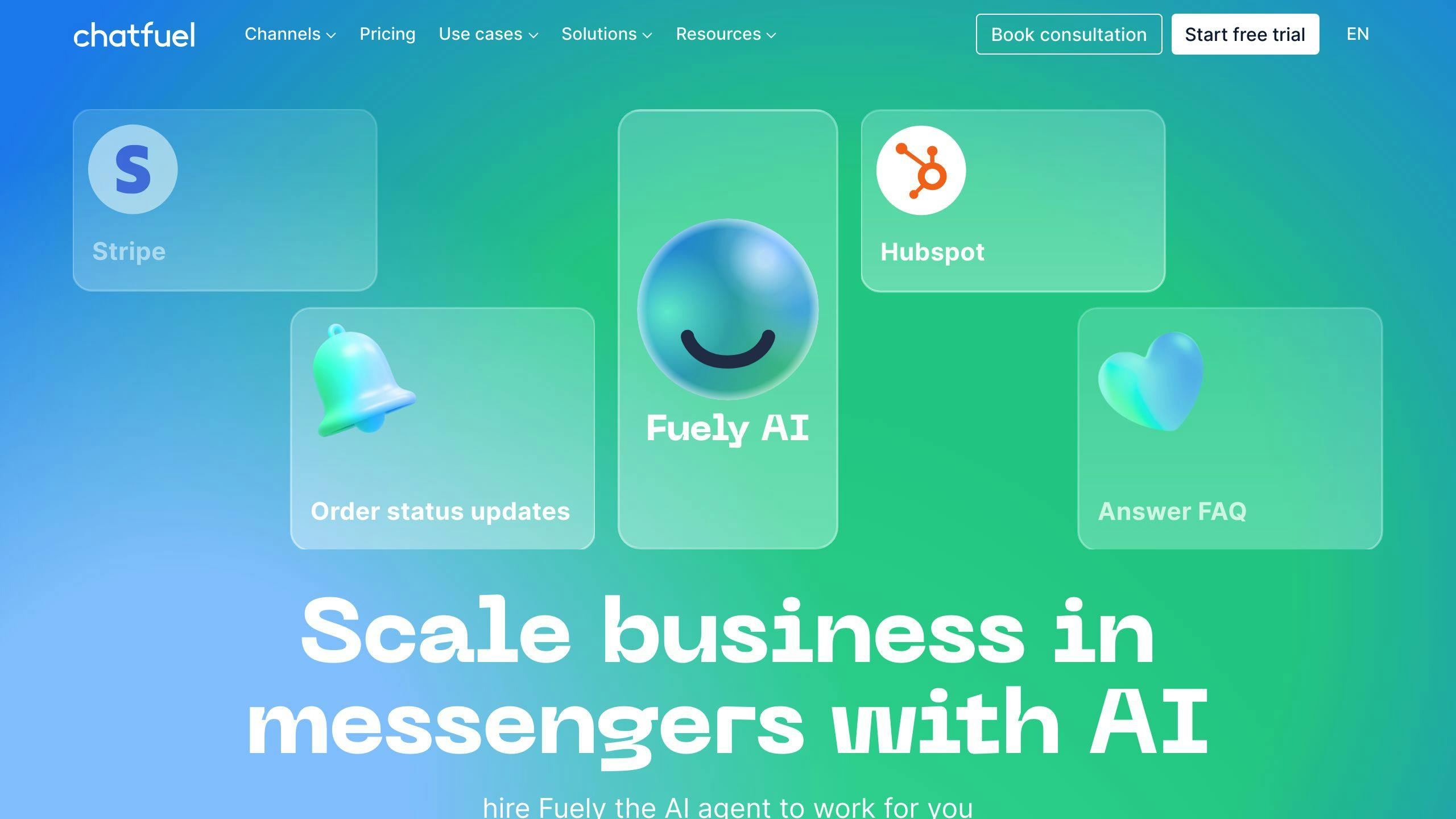
Chatfuel is a user-friendly AI chatbot platform designed specifically for restaurants to improve customer interactions and personalize marketing. Its straightforward interface and practical features make it an excellent choice for restaurants looking to automate conversations and boost customer satisfaction.
Chatfuel is a no-code chatbot platform that allows restaurants to create conversational interfaces without any coding knowledge. It supports multiple platforms, including WhatsApp, Facebook Messenger, Instagram, Telegram, Line, and website widgets. Chatfuel's AI technology enables the creation of natural and friendly chatbots that can handle customer inquiries, collect data, and reengage users.
Chatfuel's AI capabilities allow it to offer personalized menu recommendations to customers. By analyzing customer interactions and preferences, the chatbot can suggest dishes that are likely to appeal to individual customers. This enhances the customer experience and can increase sales and customer loyalty.
Chatfuel seamlessly integrates with restaurant systems, including ordering, reservation, and CRM systems. This integration enables the chatbot to access customer data, process orders, and update reservations in real-time, ensuring a smooth experience for customers and staff.
ProsConsEasy to useLimited advanced featuresGood natural language processing capabilitiesHigher cost for premium plansSeamless integrationLimited customization options
Overall, Chatfuel is a practical AI chatbot platform that can help restaurants personalize customer experiences, increase sales, and improve customer satisfaction. Its ease of use, practical features, and seamless integration make it an ideal choice for restaurants looking to automate conversations and enhance customer engagement.
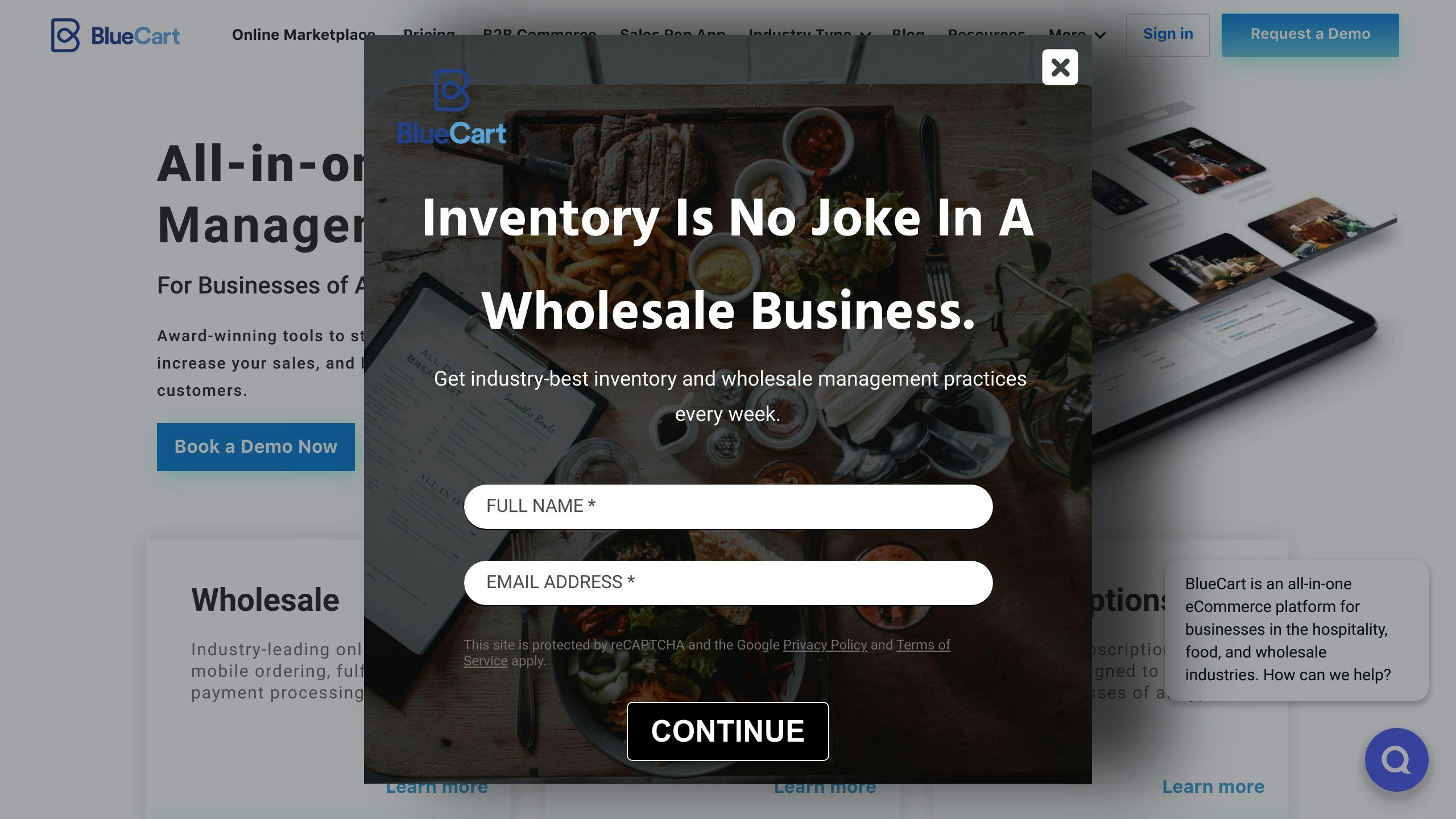
BlueCart is an AI-powered platform that helps restaurants manage inventory, streamline ordering, and track food costs. By using AI technology, BlueCart provides data-driven insights to make informed decisions about inventory and menus.
BlueCart is an all-in-one software platform for the hospitality industry. It offers solutions to simplify inventory management processes for restaurants. Whether you're a buyer or seller, BlueCart allows you to stay connected and complete all ordering operations in one place.
BlueCart's AI capabilities enable restaurants to optimize their inventory and menus based on sales data and customer preferences. By analyzing data on ingredient stock levels, recipes, purchase orders, and menu costs, BlueCart provides insights to help restaurants:
Additionally, BlueCart's AI technology can suggest menu items that customers are likely to enjoy, enhancing the overall dining experience.
BlueCart seamlessly integrates with restaurant systems, including point-of-sale (POS) systems, to provide a streamlined inventory management process. This integration enables restaurants to access customer data, process orders, and update inventory in real-time, ensuring a smooth experience for customers and staff.
ProsConsEfficient inventory managementInitial setup can be complexData-driven insightsRequires ongoing maintenanceStreamlines orderingHigher cost for smaller businesses
Overall, BlueCart is a practical AI-powered platform that can help restaurants optimize inventory management, streamline ordering, and improve profitability. Its user-friendly features and seamless integration make it a valuable tool for restaurants looking to automate inventory management and enhance customer satisfaction.
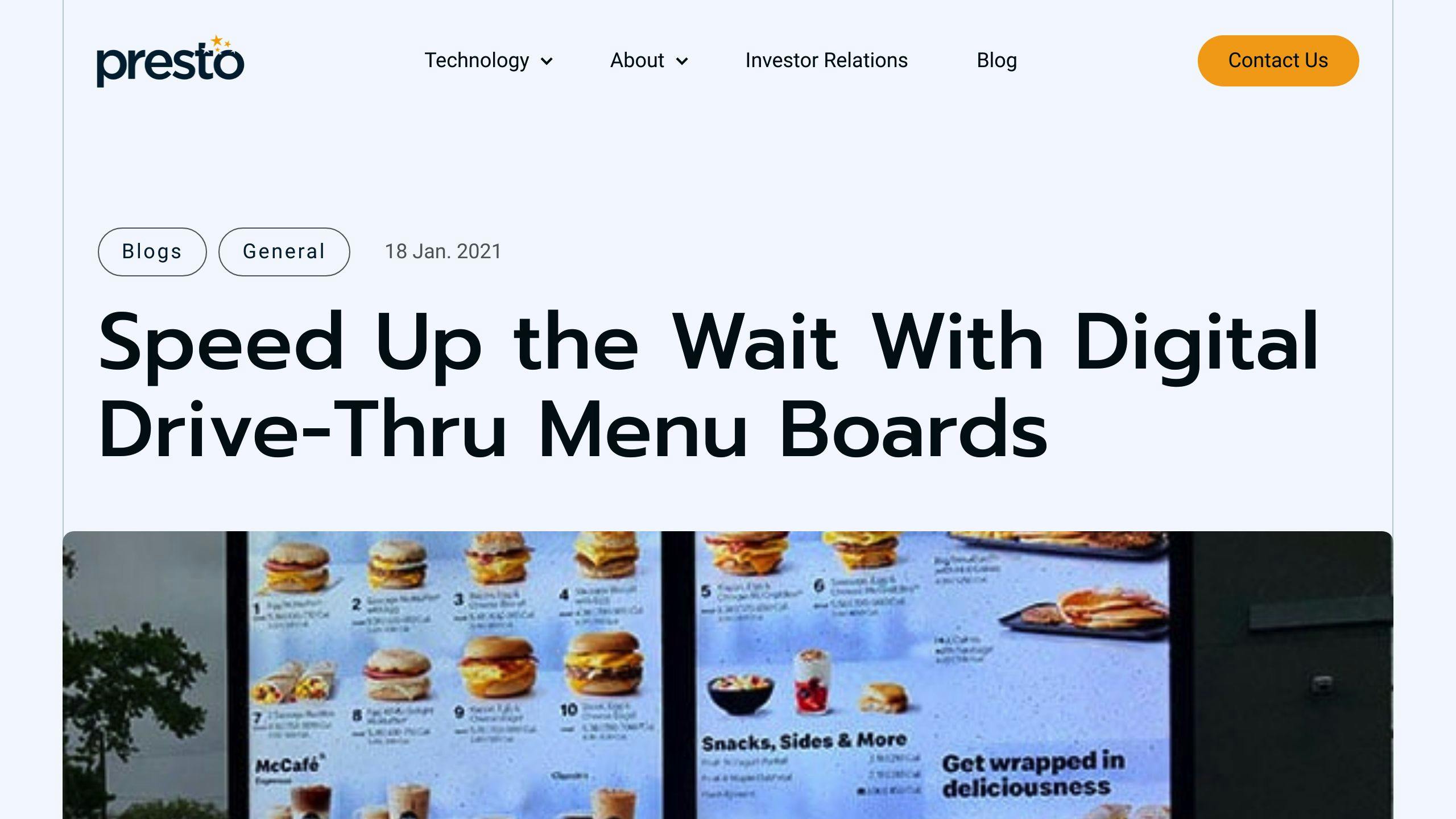
Presto is an AI solution that helps restaurants create personalized digital menus for customers. It uses camera technology and machine learning to identify repeat guests and suggest menu items tailored to their preferences.
Presto is an AI platform that integrates with restaurant systems. It uses cameras to recognize returning customers and offer menu recommendations based on their past orders and dietary needs. This technology streamlines ordering and improves operational efficiency.
Presto's AI analyzes customer data, including previous orders and dietary restrictions. It then suggests menu items that match each customer's preferences. This personalized approach enhances customer satisfaction and can increase restaurant revenue.
Presto seamlessly connects with restaurant point-of-sale (POS) systems. This integration enables real-time ordering and inventory management, ensuring accurate menu updates and reducing errors.
ProsConsImproves customer experienceRequires tech-savvy staffEnables efficient table-side orderingInitial investment costProvides real-time insightsLimited support for smaller operations
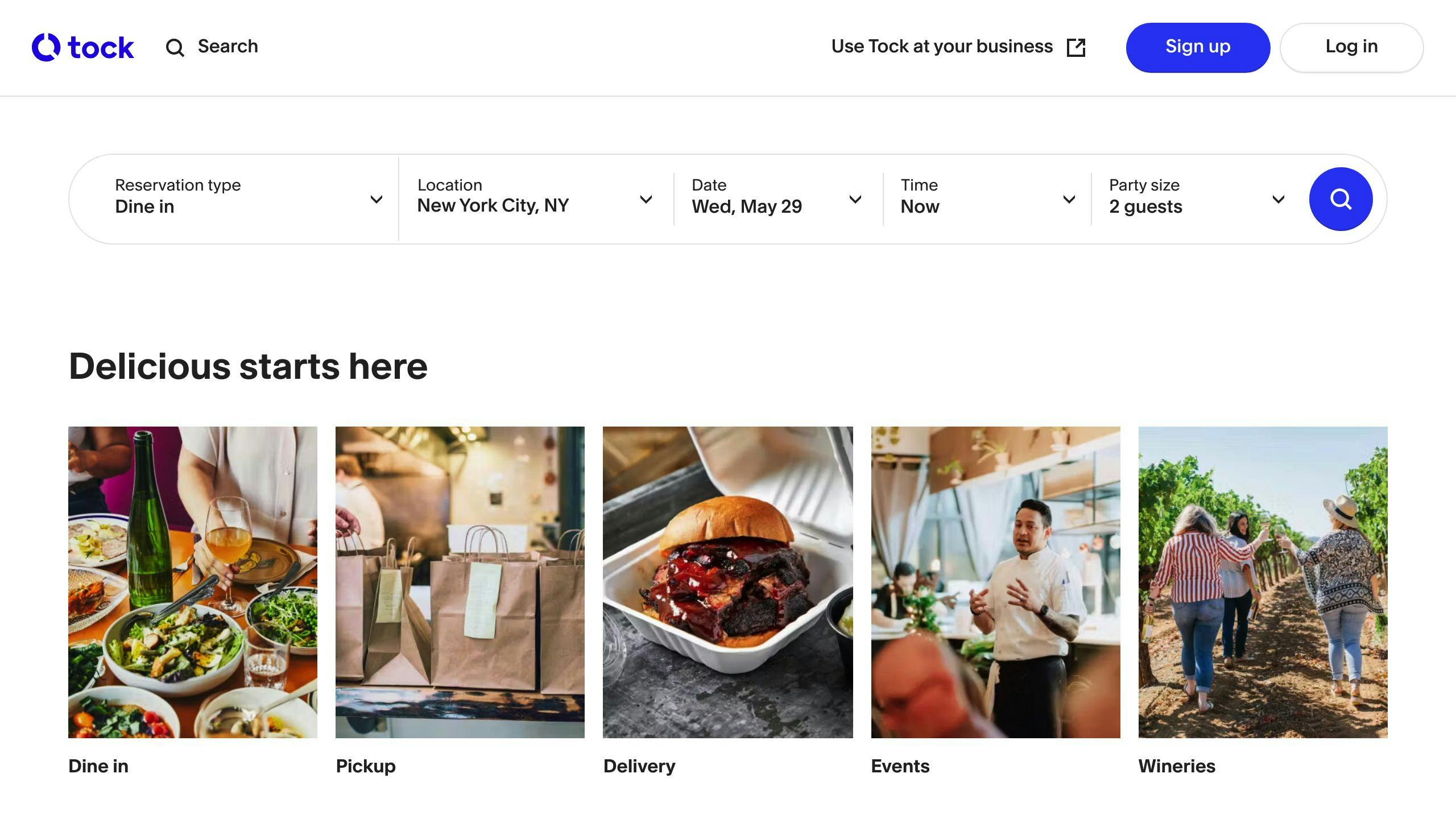
Tock is a platform that helps restaurants manage reservations, events, and customer engagement. It stands out as a leading AI solution for personalized restaurant marketing.
Tock is a reservation and event management platform for the hospitality industry. Founded by the owners of the Alinea Group in Chicago, it was acquired by Squarespace in 2021. Tock works with around 7,000 restaurants across 33 countries, offering a range of reservation experiences.
Tock's AI technology allows restaurants to create unique experiences for guests. With the Multi-Experience Tables feature, restaurants can offer different experiences or standard reservations for the same table. This enables restaurants to maximize profitability and experiment with offerings that appeal most to guests.
Tock integrates seamlessly with restaurant point-of-sale (POS) systems, ensuring accurate menu updates and reducing errors. The platform offers a flat monthly subscription fee plus a fee on prepaid reservations, making it a cost-effective solution.
ProsConsComprehensive reservation managementHigher costDetailed guest insightsSteeper learning curveOptimizes table utilizationRequires ongoing training
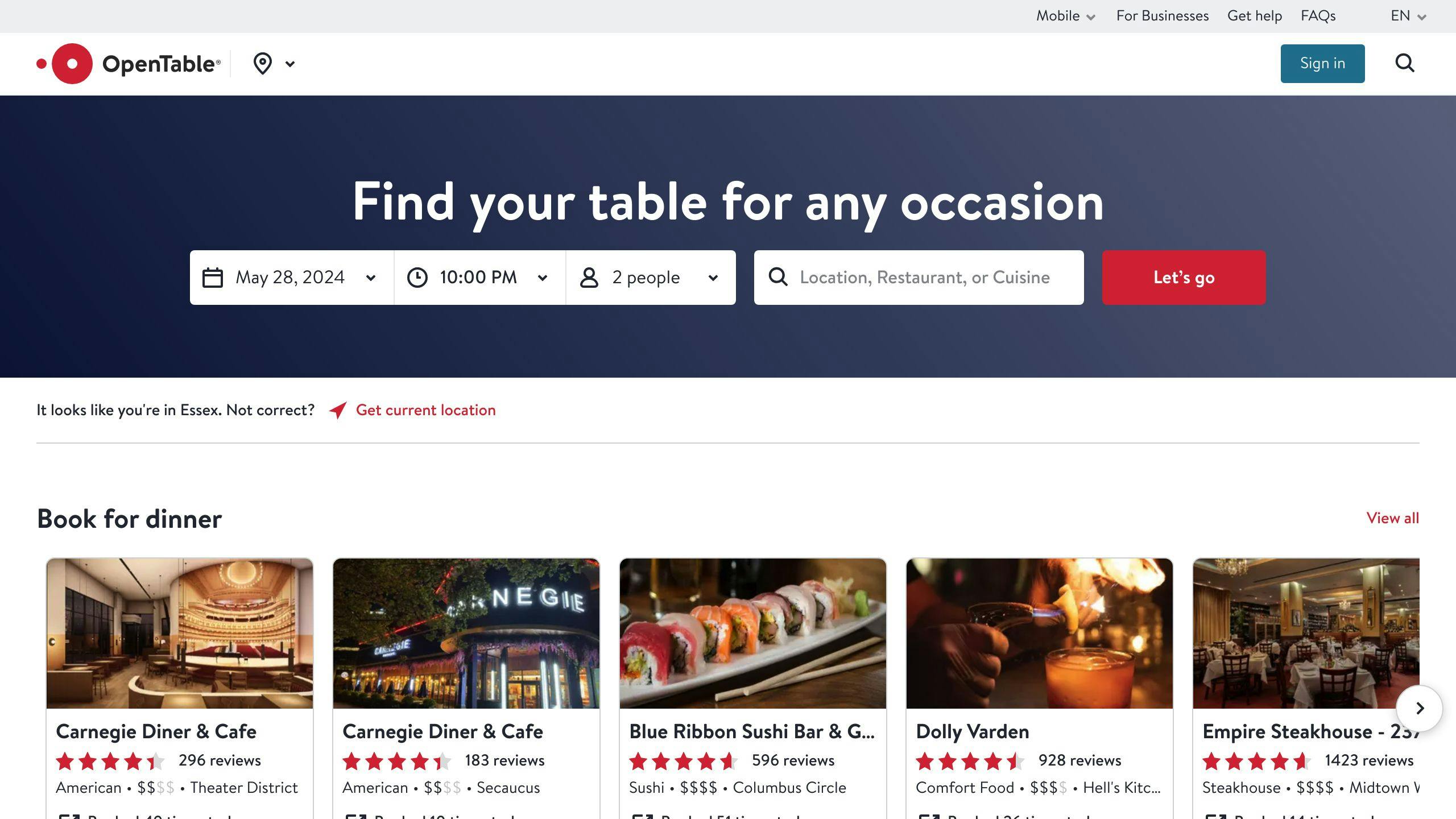
OpenTable is a popular online system that helps restaurants manage bookings, tables, and customer relationships. With its AI technology, OpenTable provides personalized experiences, streamlining operations and increasing revenue.
OpenTable is a platform that offers online reservations, table management, and guest management solutions for restaurants. Founded in 1998, it has become a trusted brand in the hospitality industry, with over 50,000 restaurants worldwide using its services.
OpenTable's AI enables restaurants to create tailored experiences for customers. With its GuestCenter system, restaurants can access real-time information about guests, including preferences, dietary needs, and reservation history. This allows restaurants to:
OpenTable integrates with various restaurant systems, including point-of-sale (POS) systems, ensuring accurate menu updates and reducing errors. Its pricing model includes:
This makes it a cost-effective solution for restaurants of all sizes.
ProsConsWidely used and trustedHigh subscription costRobust analytics toolsLimited customization optionsEffective fraud detectionDependency on a third-party platform
When choosing an AI chatbot for your restaurant, it's crucial to consider the key features and capabilities of each option. Here's a side-by-side comparison of the top 5 AI chatbots:
FeatureChatfuelBlueCartPrestoTockOpenTableUnderstands Natural LanguageYesYesYesYesYesPersonalizes InteractionsHighHighHighHighHighEasy to IntegrateYesModerateModerateYesYesSimple to DeployYesModerateModerateYesYesSupports Multiple LanguagesYesYesYesYesYesHandles High VolumesYesYesYesYesYes
This table compares the key features of each AI chatbot, including their ability to understand natural language, personalize interactions, integrate with existing systems, ease of deployment, multilingual support, and scalability to handle high volumes of interactions. By considering these factors, you can choose the AI chatbot that best meets your restaurant's needs.
Chatfuel is a straightforward AI chatbot platform designed specifically for restaurants. It offers:
BlueCart is an AI-powered platform that helps restaurants manage inventory and streamline ordering. It provides:
Presto uses AI and camera technology to create personalized digital menus for customers. It offers:
Tock is a platform that helps restaurants manage reservations, events, and customer engagement. It provides:
OpenTable is a popular online reservation system for restaurants. It offers:
AI chatbots are transforming the restaurant industry, offering new ways to enhance customer experiences, streamline operations, and drive growth. In this article, we explored the top 5 AI chatbots for personalized restaurant marketing:
Chatfuel is a user-friendly chatbot platform designed specifically for restaurants. It offers:
BlueCart is an AI-powered platform that helps restaurants manage inventory and streamline ordering. Key features include:
Presto uses AI and camera technology to create personalized digital menus for customers. It provides:
Tock is a platform that helps restaurants manage reservations, events, and customer engagement. It offers:
OpenTable is a popular online reservation system for restaurants. Key features include:
By leveraging AI chatbots, restaurants can:
When evaluating AI chatbots, consider your restaurant's specific needs and requirements. Assess features, integrations, and scalability to ensure seamless implementation and optimal results.
Yes, restaurants can use chatbots to handle customer inquiries. Chatbots act as digital assistants, providing instant responses to common questions about:
By offering 24/7 availability, chatbots streamline customer service and free up staff to focus on other tasks.
Restaurants can benefit from using chatbots in several ways:
BenefitDescriptionInstant ResponsesChatbots provide immediate answers to customer queries without wait times.24/7 AvailabilityCustomers can get assistance anytime, even outside regular business hours.Cost SavingsAutomating routine inquiries reduces the need for additional staff.Increased EfficiencyChatbots handle multiple conversations simultaneously, improving productivity.Personalized ServiceBy learning customer preferences, chatbots can offer tailored recommendations.Data CollectionChatbots gather valuable customer data to improve services and marketing strategies.
Chatbots use Natural Language Processing (NLP) technology to comprehend and respond to customer queries in a conversational manner. NLP enables chatbots to:
1. Interpret Language
Chatbots can understand the meaning and intent behind customer messages, even when phrased differently.
2. Identify Context
By analyzing the conversation context, chatbots can provide relevant and appropriate responses.
3. Learn from Interactions
Over time, chatbots can improve their understanding by learning from previous customer interactions.
4. Handle Multiple Languages
Many chatbots support multiple languages, allowing them to communicate with a diverse customer base.
Yes, modern chatbots can integrate with various restaurant systems, such as:
This integration ensures a smooth and consistent experience for customers across multiple touchpoints.

Enter your information in the form to receive a call from Loman and place an order like a customer would!